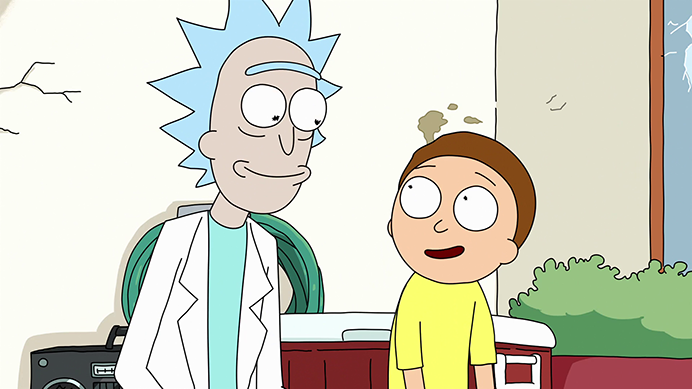“Rick and Morty” is the provocative animated television series whose absurdist yet philosophical humor stands apart from its predecessors, say, “Family Guy” and “South Park.” The Adult Swim original has accumulated a mass following in just two seasons and has taken ahold of pop culture.
The Smith family appears to be the typical nuclear family of a happily married couple with two well-adjusted children, and maybe they could be this family, if not for Grandpa Rick’s schemes and general horribleness.
As the smartest man in the universe and a raging alcoholic, Rick frequently entangles his family in perilous interdimensional adventures as well as some psychological torment.
“Rick and Morty” officially began its third season in late July after almost a two-year break. One episode played on April Fool’s Day as a reverse prank to devout fans of the show.
The second season ended following Rick’s uncharacteristic decision to sacrifice his freedom for his family’s. After months of waiting, fans were pleased to see Rick escape and continue the typical problematic adventures with his grandson.
Season 3 delves deeper into character conflict and growth as Rick plays a large role in the divorce of Beth and Jerry. A deeper side of each family member is revealed as they struggle with the separation.
The recurring outlandish conflicts catalyze the overarching emotional problems that exist within this very human family. The parents’ extreme dissatisfaction with their marriage is brought to a near breaking point when a device that sees into alternate realities reveals that their lives would have been far better off had they aborted their daughter in high school. It’s a little dark.
“Rick and Morty” frequently draws from the horrors of everyday life with rather depressing humor. Rick’s zany and ruthless humor, which drives the show, stems from alcoholism and repressed remorse over the death of his wife. His once goofy and pointless catch phrase, “wub a lub a dub dub,” is revealed to be translated in bird language as “I am in great pain, please help me.” Rick’s adventures with Morty are his only glimpses of joy in his life of apathy.
The show abides the comedic formula of tragedy plus time, emphasis on the tragedy. The morbid is hilarious, and suffering is frequently the punchline of a joke.
In my favorite episode, “Total Rickall,” Beth almost murders a beloved family friend with a gruesome and spontaneous gunshot to the chest. In the episode, their home was infected by a virus that invades memories and materializes as new and endearing characters with concrete flashbacks. Despite no appearance in any other episode, Mr. Poopy Butthole illogically was an actual person. Instead of disappearing like the other viruses, bloodshed and screams of agony brought forth stunned and sadistic laughter.
“Rick and Morty” attacks life’s largest complexities and ignored truths. One adventure involved a planet with no violence or sadness because the people’s minds were all controlled by a supreme leader. This disgusted Morty, and he attempted to liberate the planet. When the leader accidentally relinquishes some of her control, her subjects immediately delve into a catastrophic race war.
This episode suggests that as long as there is free will, there will always be conflict. Whether the aimlessness of human existence or the comforting false promises of religion, this cartoon has caused viewers many haunting nights of critical thinking.



